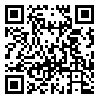Volume 8, Issue 2 (11-2024)
J Social Behav Communit Health 2024, 8(2): 1407-1421 |
Back to browse issues page
Download citation:
BibTeX | RIS | EndNote | Medlars | ProCite | Reference Manager | RefWorks
Send citation to:



BibTeX | RIS | EndNote | Medlars | ProCite | Reference Manager | RefWorks
Send citation to:
Arab Moghaddam N, Soroush M, Joulaei H, Alborzi S, Jalili R. Religion as a Social Determinant of Health: Perceived Role of Religiosity in Risky Behavior and Social Problems. J Social Behav Communit Health 2024; 8 (2) :1407-1421
URL: http://sbrh.ssu.ac.ir/article-1-259-en.html
URL: http://sbrh.ssu.ac.ir/article-1-259-en.html
1- Academic Center for Educarion, Culture and Research- Fars Branch. Shiraz, Iran
2- Health Policy Research Center (HPRC), Institute of Health, Shiraz University of Medical Sciences, Shiraz, Iran ,Joulaei_h@yahoo.com
2- Health Policy Research Center (HPRC), Institute of Health, Shiraz University of Medical Sciences, Shiraz, Iran ,
Abstract: (1058 Views)
Background: Religion as a social determinants of health(SDOH) has long been a topic of fascination and debate, affecting various aspects of human life, including behavior. Some behaviors cause social problems due to harmful consequences they have when they become popular. Risky health behaviors are part of these social issues
Method: This study employs Interpretative Phenomenological Analysis (IPA) to explore individuals' perceptions of the role of religiosity in social problems in Shiraz in 2022 . To gain deeper insights into this relationship, we conducted semi- structured in-depth interviews with 14 participants, who engaged in various forms of risky behavior.
Results: The study revealed four distinct themes: a constructive viewpoint, where religion was seen as integral to addressing social issues, guiding individuals towards positive behavior; a destructive viewpoint, where religion was perceived as a source of harm and risky behavior; a separation between social issues and religion, indicating that certain social problems and behavior transcend religious definitions; and the interaction of religion with some factors which underscores the interplay between religion and other determinants, such as economic status, in shaping perceptions of social problems. Economic status emerged as a significant factor influencing participants' perspectives on social issues and risky behavior.
Conclusion: This study showed that understanding of people involved in high-risk behaviors about the role of religion in the occurrence of these behaviors and social damages are very different. Some consider religion to be very effective in preventing these behaviors, and some consider religion to be the cause of social damage, emphasizing the importance of considering these diverse perspectives in addressing social issues in contemporary society.
Method: This study employs Interpretative Phenomenological Analysis (IPA) to explore individuals' perceptions of the role of religiosity in social problems in Shiraz in 2022 . To gain deeper insights into this relationship, we conducted semi- structured in-depth interviews with 14 participants, who engaged in various forms of risky behavior.
Results: The study revealed four distinct themes: a constructive viewpoint, where religion was seen as integral to addressing social issues, guiding individuals towards positive behavior; a destructive viewpoint, where religion was perceived as a source of harm and risky behavior; a separation between social issues and religion, indicating that certain social problems and behavior transcend religious definitions; and the interaction of religion with some factors which underscores the interplay between religion and other determinants, such as economic status, in shaping perceptions of social problems. Economic status emerged as a significant factor influencing participants' perspectives on social issues and risky behavior.
Conclusion: This study showed that understanding of people involved in high-risk behaviors about the role of religion in the occurrence of these behaviors and social damages are very different. Some consider religion to be very effective in preventing these behaviors, and some consider religion to be the cause of social damage, emphasizing the importance of considering these diverse perspectives in addressing social issues in contemporary society.
Type of Study: Original Article |
Subject:
Social Behavior
Received: 2024/08/18 | Accepted: 2024/10/1 | Published: 2024/11/20
Received: 2024/08/18 | Accepted: 2024/10/1 | Published: 2024/11/20
Send email to the article author
| Rights and permissions | |
 |
This work is licensed under a Creative Commons Attribution-NonCommercial 4.0 International License. |







